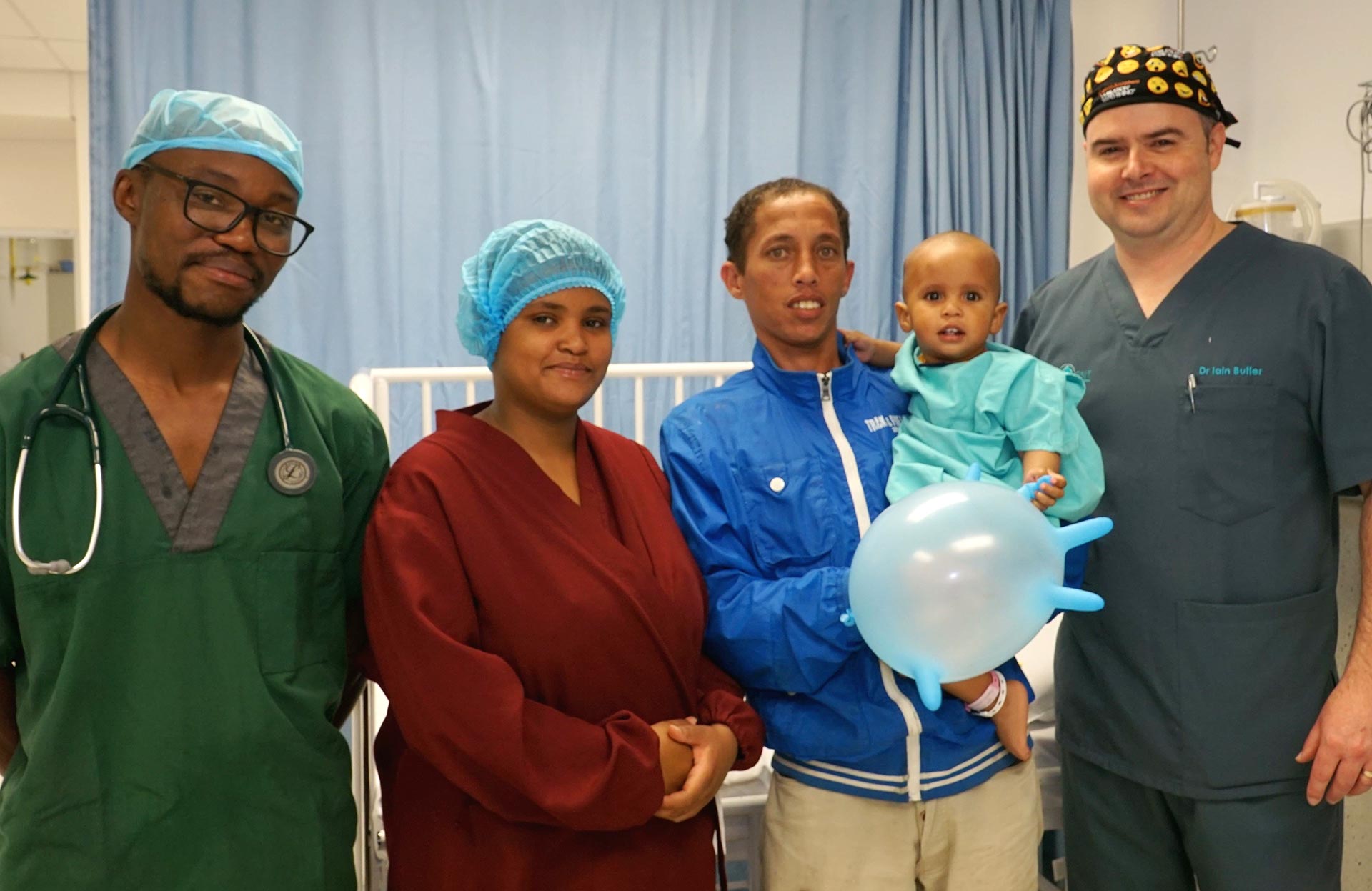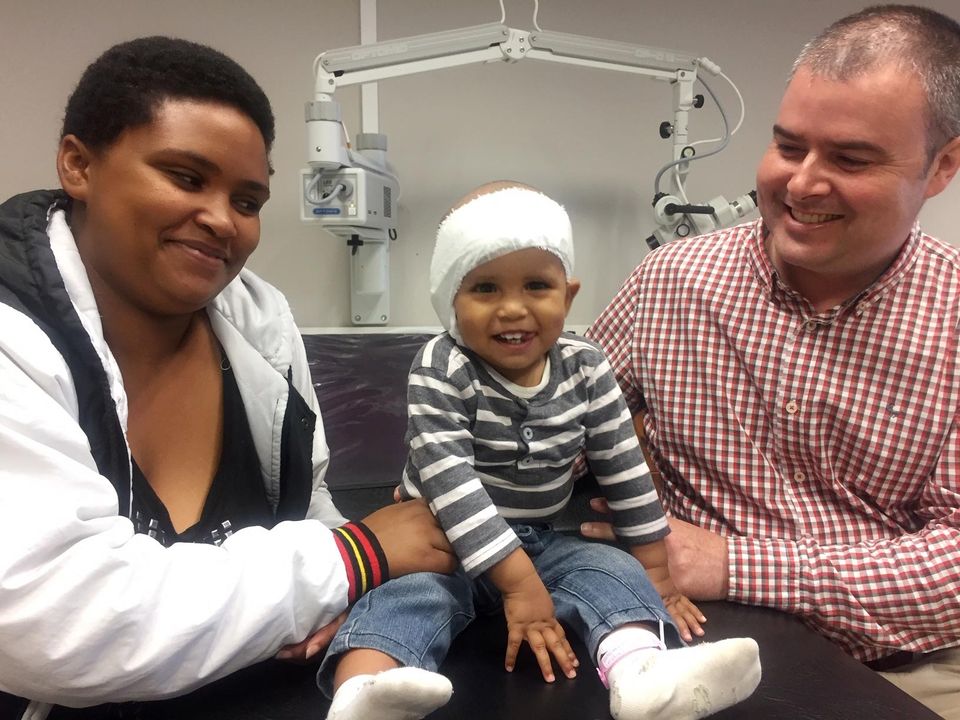Good Samaritans bring the world of sound to brave 18-month-old Port Elizabeth boy
Drickus Maartens • November 20, 2019
Above: Grayson Marais with his parents, Mr Christopher Murphy and Mrs Antoinette Marais (centre), pictured at Netcare Greenacres Hospital just prior to the cochlear implant procedure. With them are anaesthetist, Dr Chris Ngaka (left), and ear, nose and throat (ENT) specialist, Dr Iain Butler.
Medical team enables implantation of cochlear hearing device
Brave 18-month-old Grayson Marais from Port Elizabeth experienced the world of sound for the very first time yesterday, thanks to the goodwill of a team of specialists, Netcare
Greenacres Hospital, the Netcare Foundation and the Port Elizabeth Provincial Hospital.
This team recently joined hands to ensure that the pro bono cochlear implant procedure which was undertaken at the well-known Port Elizabeth private hospital by ear, nose and throat (ENT) specialist, Dr Iain Butler with the assistance of anaesthetist, Dr Chris Ngaka.
“Grayson’s implantation procedure was completed successfully, and he was doing well when we removed his bandages and stitches at our first follow up consultation recently,” comments Dr Butler. “His cochlear device was turned on for the first time at Port Elizabeth Provincial Hospital yesterday and we are hopeful that with the necessary speech and listening therapies, he will go on to hear and to be able to speak normally. My colleagues and I were thrilled to have been able to assist this delightful little boy, who always has a big smile on his face.”
Grayson’s mother, Antoinette Marais, adds: “My family and I are so grateful that my son was able to receive the great gift of this cochlear implantation, and we would like to convey our deepest appreciation to Dr Butler and his team for doing the procedure free of charge, as well as to the Netcare Foundation and Netcare Greenacres Hospital for covering all the theatre and other in-hospital costs of Grayson’s procedure and to the Port Elizabeth Provincial Hospital for covering the costs of the cochlear device.”
“My family and I are also thankful to audiologist, Babalwa Potelwa at Port Elizabeth Provincial Hospital who first detected Grayson’s hearing problem and who has been exceptionally supportive throughout,” she says.
Above:
Brave 18-month-old Grayson Marais from Port Elizabeth (centre) pictured just prior to his bandages being removed at Netcare Greenacres Hospital. With Grayson is his mother Antoinette Marais (left), and Dr Iain Butler, the ear, nose and throat (ENT) specialist who performed the cochlear implant.
According to Dr Butler, Grayson was born with profound hearing impairment, and ordinary hearing aids would not have been a solution for his condition. “The early implantation of a cochlear device is important for children such as Grayson, as it enables them to become familiar with sound as early as possible and to develop their speech and communication skills from an early age. This also shows the importance of the early detection of hearing problems in new-borns,” he adds.
“It is, however, important to note that the implantation of the cochlear device in a child born as profoundly deaf as Grayson, is only the first step, as intensive follow-up speech and listening therapies in the years to come are also critically important in their journey to hearing and speaking. Where this can be facilitated, the device enables the child’s development to follow a normal development trajectory and is positively life-changing.”
Dr Butler explains that the external ‘microphone’ part of the cochlear device picks up signals from the environment, which the implant then sends directly to the auditory nerve in the ear and to the brain, which comes to recognise the signal as sound. In this way the complex cochlear implant technology is able to bypass the damaged areas of the ear.
“A child such as Grayson, who has not heard sound in his life before, can become overwhelmed when the device is first turned on. For this reason, we start off using a very low ‘volume’. Then, as the child becomes more familiar with hearing these new sounds from the environment, the ‘volume’ is turned up gradually over a number of weeks.”
Approximately three to six in 1 000 children are born with some form of hearing impairment, which is the most common of the sensory deficits occurring in newborns. Approximately one in 1 000 children are born with profound hearing impairment, such as was the case with Grayson. Dr Butler says cochlear implantation can provide a real solution for children born with profound deafness, but the device and supporting therapies are costly.
“As private practitioners, we look to link up with the state health sector and non-governmental organisations at least a couple of times every year to assist in addressing the huge need among underprivileged children who are born deaf for appropriate medical intervention.
“In fact, Dr Retief and I performed a cochlear procedure on Grayson’s brother a year ago and he has responded well to the treatment,” says Dr Butler. It is great for us to be able to team up with Netcare Greenacres Hospital and the Netcare Foundation on such initiatives that make a meaningful and long-term difference in the lives of children.”
“Corporate social responsibility is entrenched in our organisation. Throughout our Netcare operations, doctors and staff members have a deep commitment to assist in improving the quality of life for less privileged individuals and communities through many different outreach initiatives,” says Mande Toubkin, who heads up the corporate social investment (CSI) department in Netcare and is also a director of the Netcare Foundation.
She explains that other specialised surgical programmes that are supported by the Netcare Foundation on an ongoing basis include craniofacial surgery to correct severe facial anomalies, surgical correction of cleft lip and palate mainly in children, and cataract surgery to restore the sight of mainly senior citizens.
Andre Bothma, general manager of Netcare Greenacres Hospital, says the staff at the facility felt privileged to have been of assistance to the energetic and courageous little boy and his family.
“Our aim at Netcare Greenacres Hospital is to provide each of our patients and their families with medical treatment and personal care that are appropriate and beneficial for their particular condition and personal circumstances. We trust that his procedure will be of great benefit to little Grayson,” concludes Bothma.

Colorectal cancer, one of the most prevalent yet preventable cancers, can develop in the colon or rectum, often starting as small polyps that can quietly become malignant if left unchecked. Dr Mpho Ramabulana, a colorectal surgeon and gastroenterologist at Netcare Akasia Hospital, underscores the life-saving power of vigilance and the importance of early detection.

The lives of millions of South Africans with a litany of rare diseases can be vastly improved, and even saved, by addressing challenges in identifying, studying and treating their conditions. With Rare Disease Day on the 28th of February 2025, the Rare Diseases Access Initiative (RDAI) is driving an evolution of the country’s healthcare, through innovative strategies to better care for over 4.2million people living with an estimated 7000 rare diseases. “As our healthcare system faces significant changes in the years ahead, it is vital that we also advocate for people living with rare diseases in South Africa, especially those with limited healthcare access,” said Kelly du Plessis, CEO of Rare Diseases South Africa (RDSA), a member of RDAI. “As part of our ongoing research and awareness efforts, RDAI has conducted an initial analysis of the incidence and prevalence of rare diseases within the country.” This research will assist in improving access to healthcare, policy development, and patient advocacy, while giving critical insight into the challenges faced by patients. “According to research, some rare diseases affect fewer than 1 in a million people, while others, such as Down syndrome, cystic fibrosis, and haemophilia, have a more recognisable prevalence,” says Dr. Helen Malherbe, RDAI lead researcher on rare disease prevalence data. “Many conditions are undetected, underdiagnosed or misdiagnosed, with too many having no information available about them at all.” The RDAI was formed in 2019 to promote a more favourable environment for those impacted by rare diseases in South Africa. Participants include Ampath, the Board of Healthcare Funders (BHF), Discovery Health, Genetic Counsellors South Africa (SASHG), the Government Employees Medical Scheme (GEMS), Health Funders Association (HFA), Medihelp, Medscheme, North-West University (NWU), Rare Diseases South Africa (RDSA), the South African Medical Association (SAMA) and The South African Medical Technology Industry Association (SAMED). The Council for Medical Schemes (CMS) participates as an observer. In the same year, Rare Disease International signed a memorandum of understanding with the World Health Organisation leading to an international rare disease policy framework. In 2021, the United Nations General Assembly moved to adopt a resolution recognising 300 million people living with rare diseases worldwide. “A general lack of awareness and delayed diagnosis remain major hurdles for those affected by rare diseases. Policymakers and healthcare stakeholders need to prioritise access to treatment, diagnosis, and support for rare disease patients,” says Bada Pharasi, CEO of IPASA, “Through this initiative, working collaboratively with stakeholders at every level of the healthcare supply chain, we can bring real and meaningful change to those affected, including family members and care givers, through smart and efficient strategies.” The globally agreed definition of a rare disease is any medical condition with a specific pattern of clinical signs, symptoms, and findings that affects fewer than or equal to 1 in 2000 persons in a population. “Most are genetic, and some are inherited and passed down in families,” Malherbe says. “Some affect only the patient’s genetic recipe, while others may be acquired during life due to infection, trauma, or environmental effects. For many, the cause is still unknown. “These conditions mainly affect children, as they are largely incurable and many are life-threatening. Some require specialised and co-ordinated care, some have limited and expensive treatment options, while others have no information or effective treatments at all,” she adds. The RDAI is calling for a patient-centred care model built on equitable access, transparency and efficiency. Naturally, this model calls for the open participation of patients, the healthcare industry, health professionals, and the Government. “The most critical elements are robust diagnosis standards, improved access to treatment, data collection and management, co-ordination of care, measurement of outcomes and ongoing collaborative research,” du Plessis says. “We need to establish rare disease advisory committees, map gaps and opportunities, establish system requirements, create a roadmap and plan a phased implementation with clear timelines.” The RDAI states that these policy development steps would be a start in quantifying the disease burden and defining standards of care. This would be followed by building and strengthening the capacity to facilitate appropriate diagnosis, treatment, continuity and data monitoring. Thoneshan Naidoo, Chief Executive Officer of the Health Funders Association noted that, “We appreciate the unique opportunity provided by RDAI which enables stakeholders across the industry to work together and identify strategies that improve equitable access to the appropriate diagnosis, treatment and healthcare services for rare disease patients, in an affordable and sustainable manner, taking account of the other pressing needs across the healthcare system.” “True innovation in healthcare is only possible through partnerships and joint advocacy efforts that raise awareness and improve access to treatment. Our long-term goal is the development of a rare diseases policy framework and guidelines for coordinated care,” says Pharasi. “Our members are united in the commitment to unlocking improved patient outcomes and improving access to services and robust health needs assessment facilities.” he concludes. About RDAI The Rare Diseases Access Initiative (RDAI) is dedicated to advocating for improved healthcare access, policy development, and patient support for those affected by rare diseases in South Africa. The initiative brings together key healthcare stakeholders, including pharmaceutical associations, funders, genetic specialists, and patient advocacy groups, to drive impactful change. About RDSA Founded in 2013, Rare Diseases South Africa (RDSA) is a non-profit organisation advocating to ensure that people living with rare diseases and congenital disorders experience greater recognition, support, improved health service and better overall quality of life. Started out of personal need following the diagnosis of organisation founder, Kelly du Plessis' son, it became evident that there was a lack of awareness and support for rare diseases in general in South Africa. About IPASA The Innovative Pharmaceutical Association South Africa (IPASA) is a voluntary trade association representing 24 leading pharmaceutical companies committed to research, development, and innovation. Our mission is to drive healthcare advancement by advocating for policies that improve patient access to safe, high-quality, and affordable medicines.












